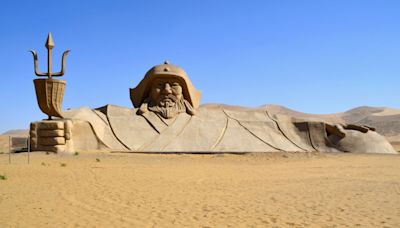Search results
People also ask
Who was Genghis Khan?
Who founded the Mongol Empire?
When did Genghis Khan become a king?
Who were the Mongols and what did they do?
May 8, 2024 · The Mongol empire was founded by Genghis Khan in 1206. It extended from the Pacific Ocean to the Danube River and the Persian Gulf. At its greatest extent, it covered some 9 million square miles of territory, making it the largest contiguous land empire in history. Learn more about the Mongol empire in this article.
- The Editors of Encyclopaedia Britannica
Nov 9, 2009 · Mongol leader Genghis Khan (1162-1227) rose from humble beginnings to establish the largest land empire in history. After uniting the nomadic tribes of the Mongolian plateau, he conquered...
Mar 17, 2020 · Collection. Through the 13th and 14th century CE the Mongols forged the largest connected empire the world had ever seen and such figures as Genghis Khan and Kublai Khan were feared as the devil himself, their mounted warriors conquering for their leaders territories from Europe to Korea.
- Mark Cartwright
- Publishing Director
Sep 16, 2019 · Genghis Khan (aka Chinggis Khan) was the founder of the Mongol Empire which he ruled from 1206 until his death in 1227. Born Temujin, he acquired the title of Genghis Khan, likely meaning 'universal ruler’, after unifying the Mongol tribes.
Nov 11, 2019 · The Mongol Empire (1206-1368) was founded by Genghis Khan (r. 1206-1227), first Great Khan or 'universal ruler' of the Mongol peoples. Genghis forged the empire by uniting nomadic tribes of the Asian steppe and creating a devastatingly effective army with fast, light, and highly coordinated cavalry.

